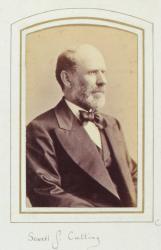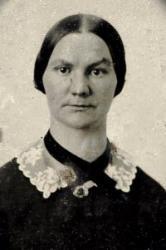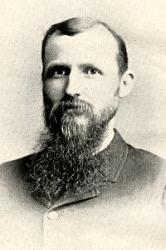Planning worship?
Check out our sister site, ZeteoSearch.org,
for 20+ additional resources related to your search.
- |
User Links
Person Results
John Milton
1563 - 1647 Person Name: John Milton, the elder, c. 1563-1647 Scripture: Psalm 146 Arranger of "YORK" in The Irish Presbyterian Hymnbook Father of the poet, b. Stanton St. John, nr. Oxford, ca. 1563; d. London, buried 3-15-1647; English amateur composer
John Milton
William B. Bradbury

1816 - 1868 Person Name: Wm. B. Bradbury Scripture: Psalm 146 Composer of "[Hallelujah! Praise Jehovah]" in Bible Songs William Bachelder Bradbury USA 1816-1868. Born at York, ME, he was raised on his father's farm, with rainy days spent in a shoe-shop, the custom in those days. He loved music and spent spare hours practicing any music he could find. In 1830 the family moved to Boston, where he first saw and heard an organ and piano, and other instruments. He became an organist at 15. He attended Dr. Lowell Mason's singing classes, and later sang in the Bowdoin Street church choir. Dr. Mason became a good friend. He made $100/yr playing the organ, and was still in Dr. Mason's choir. Dr. Mason gave him a chance to teach singing in Machias, ME, which he accepted. He returned to Boston the following year to marry Adra Esther Fessenden in 1838, then relocated to Saint John, New Brunswick. Where his efforts were not much appreciated, so he returned to Boston. He was offered charge of music and organ at the First Baptist Church of Brooklyn. That led to similar work at the Baptist Tabernacle, New York City, where he also started a singing class. That started singing schools in various parts of the city, and eventually resulted in music festivals, held at the Broadway Tabernacle, a prominent city event. He conducted a 1000 children choir there, which resulted in music being taught as regular study in public schools of the city. He began writing music and publishing it. In 1847 he went with his wife to Europe to study with some of the music masters in London and also Germany. He attended Mendelssohn funeral while there. He went to Switzerland before returning to the states, and upon returning, commenced teaching, conducting conventions, composing, and editing music books. In 1851, with his brother, Edward, he began manufacturring Bradbury pianos, which became popular. Also, he had a small office in one of his warehouses in New York and often went there to spend time in private devotions. As a professor, he edited 59 books of sacred and secular music, much of which he wrote. He attended the Presbyterian church in Bloomfield, NJ, for many years later in life. He contracted tuberculosis the last two years of his life.
John Perry
William B. Bradbury
Graham Kendrick

b. 1950 Person Name: Graham Kendrick (1950-) Scripture: Psalm 146 Author of "The Trumpets Sound, the Angels Sing" in Common Praise (1998) Graham Kendrick (b. England, August 2, 1950), the son of a Baptist minister in Northamptonshire, is one of the most prolific Christian singer-songwriters in the United Kingdom. He’s written music for over thirty years, and to date has released thirty-eight albums. He is best known for his songs “Shine, Jesus, Shine,” “Knowing You,” and “The Servant King.” Kendrick has received honorary doctorates in divinity from Brunel University and Wycliffe College. In 1987 he helped co-found the March for Jesus, which today is a global phenomenon in which Christians take their faith to the streets in a celebration of Christ. In 1995 Kendrick received a Dove Award for his international work, and he remains an active advocate for Compassion International, which is a Christian child sponsorship organization dedicated to the long-term development of children living in poverty around the world, and also is a contributor to CompassionArt, an organization with the aim of generating income from works of art to assist in the relief of suffering around the planet.
Laura de Jong
Graham Kendrick
Sewall S. Cutting

1813 - 1882 Person Name: Dr. S. S. Cutting Scripture: Psalm 146:8 Author of "O Saviour, I am Blind!" in Sacred Songs and Solos Cutting, Sewell Sylvester, D.D., a Baptist Minister, was born at Windsor, Vermont, Jan. 19, 1813, graduated at the University of Vermont, 1835, and was ordained at Boylston, Massachusetts, 1836. He was pastor at Southbridge, Mass., from 1837 to 1845. Editor of the New York Recorder. 1845-50, and 1853-55; and of the Christian Review, 1850-53, and 1855-68. In 1868 he was appointed Professor of Rhetoric and History at the University, Rochester, N. York, and Secretary of the American Baptist Educational Commission. He died at Brooklyn, Feb. 7, 1882. His Historical Vindication of the Baptists was published in 1858.
His hymns in common use include:—
1. Father, we bless the gentle care. The love of God. Appeared in Hymns for the Vestry and Fireside, Boston, 1841.
2. Gracious Saviour, we adore Thee. Holy Baptism. Appeared in Winchell's Additional Hymns, 1832, No. 509 (the author being then but 19); again in the Psalmist, 1843, and others.
3. Great God, Thy glories blaze. Praise to God the Father. Appeared in Linsley and Davis's Select Hymns, 1836-41, No. 514. In the Psalmist, 1843, it was altered to "God of the world, Thy glories shine." This is repeated in several collections, including the Baptist Praise Book, 1871, in 4 stanzas of 4 lines. In the Baptist Service of Song, 1871, it is given as "God of the world, near and afar," is expanded into 5 stanzas, and is dated 1835.
4. 0 Saviour, I am blind, Lead Thou my way. The True Guide. This hymn, in I. D. Sankey's Sacred Songs and Solos, is also by Dr. Cutting. [Rev. F. M. Bird, M.A.]
--John Julian, Dictionary of Hymnology (1907)
Sewall S. Cutting
Mrs. A. L. Davison

1851 - 1887 Scripture: Psalm 146:5 Author of "Two Angels: Hope and Prayer" in National Tidings of Joy Born: 1851, Cuyahoga Falls, Ohio.
Died: March 10, 1887, Chicago, Illinois.
Buried: Carthage, Missouri.
Fannie’s father was killed when she was 10 years old; after her mother’s remarriage to hotelier Henry Warner, the family moved to Carthage, Missouri. Fannie married court reporter Asa Lee Davison and they moved to Chicago, Illinois, then Madison, Wisconsin. Several of her songs appeared in publications from the Fillmore Brothers of Cincinnati, Ohio, including Songs of Gratitude (1877), Joy and Gladness (1880) and The Voice of Joy (1882).
Lyrics--
Last Words, The
Purer in Heart, O God
--hymntime.com/tch/bio
Mrs. A. L. Davison
Michael Perry

1942 - 1996 Person Name: Michael A. Perry Scripture: Psalm 146:5-9 Author of "Bless’d Be the God of Israel" in Voices Together Initially studying mathematics and physics at Dulwich College, Michael A. Perry (b. Beckenham, Kent, England, 1942; d. England, 1996) was headed for a career in the sciences. However, after one year of study in physics at the University of London, he transferred to Oak Hill College to study theology. He also studied at Ridley Hall, Cambridge, and received a M.Phil. from the University of Southhampton in 1973. Ordained a priest in the Church of England in 1966, Perry served the parish of St. Helen's in Liverpool as a youth worker and evangelist. From 1972 to 1981 he was the vicar of Bitterne in Southhampton and from 1981 to 1989, rector of Eversley in Hampshire and chaplain at the Police Staff College. He then became vicar of Tonbridge in Kent, where he remained until his death from a brain tumor in 1996. Perry published widely in the areas of Bible study and worship. He edited Jubilate publications such as Hymns far Today's Church (1982), Carols far Today (1986), Come Rejoice! (1989), and Psalms for Today (1990). Composer of the musical drama Coming Home (1987), he also wrote more than two hundred hymns and Bible versifications.
Bert Polman
Michael Perry
William F. Sherwin

1826 - 1888 Person Name: W. F. Sherwin Scripture: Psalm 146:8 Composer of "[O Saviour, I am blind]" in Sacred Songs and Solos Sherwin, William Fisk, an American Baptist, was born at Buckland, Massachusetts, March 14,1826. His educational opportunities, so far as schools were concerned, were few, but he made excellent use of his time and surroundings. At fifteen he went to Boston and studied music under Dr. Mason: In due course he became a teacher of vocal music, and held several important appointments in Massachusetts; in Hudson and Albany, New York County, and then in New York City. Taking special interest in Sunday Schools, he composed carols and hymn-tunes largely for their use, and was associated with the Rev. R. Lowry and others in preparing Bright Jewels, and other popular Sunday School hymn and tune books. A few of his melodies are known in Great Britain through I. D. Sankey's Sacred Songs and Solos, where they are given with his signature. His hymnwriting was limited. The following pieces are in common use:—
1. Grander than ocean's story (1871). The Love of God.
2. Hark, bark, the merry Christmas bells. Christmas Carol.
3. Lo, the day of God is breaking. The Spiritual Warfare.
4. Wake the song of joy and gladness. Sunday School or Temperance Anniversary.
5. Why is thy faith, 0 Child of God, so small. Safety in Jesus.
Mr. Sherwin died at Boston, Massachusetts, April 14, 1888.
-- John Julian, Dictionary of Hymnology (1907)
==================
Sherwin, W. F., p. 1055, i. Another hymn from his Bright Jewels, 1869, p. 68, is "Sound the battle cry" (Christian Courage), in the Sunday School Hymnary, 1905, and several other collections.
--John Julian, Dictionary of Hymnology, New Supplement (1907)
William F. Sherwin
William Hayes

1706 - 1777 Person Name: W. Hayes Scripture: Psalm 146 Composer of "[Praise ye the Lord]" in The Methodist Hymn-Book with Tunes William Hayes (26 January 1708 (baptised) – 27 July 1777) was an English composer, organist, singer and conductor.
Hayes was born in Gloucester. He trained at Gloucester Cathedral and spent the early part of his working life as organist of St Mary’s, Shrewsbury (1729) and Worcester Cathedral (1731). The majority of his career was spent at Oxford where he was appointed organist of Magdalen College in 1734, and established his credentials with the degrees of B.Mus in 1735 and D.Mus in 1749. (He was painted by John Cornish in his doctoral robes around 1749.) In 1741 he was unanimously elected Professor of Music and organist of the University Church. He presided over the city’s concert life for the next 30 years, and was instrumental in the building of the Holywell Music Room in Oxford in 1748, the oldest purpose-built music room in Europe. He was one of the earliest members of the Royal Society of Musicians, and in 1765 was elected a ‘privileged member’ of the Noblemen’s and Gentlemen’s Catch Club. He died in Oxford, aged 69.
William Hayes was an enthusiastic Handelian, and one of the most active conductors of his oratorios and other large-scale works outside London. His wide knowledge of Handel left a strong impression on his own music, but by no means dominated it. As a composer he tended towards genres largely ignored by Handel—English chamber cantatas, organ-accompanied anthems and convivial vocal music—and his vocal works show an English preference for non-da capo aria forms. Hayes also cultivated a self-consciously ‘learned’ polyphonic style (perhaps inspired by his antiquarian interests) which can be seen in his many canons, full-anthems, and the strict fugal movements of his instrumental works. Nevertheless, several of his late trio sonatas show that he was not deaf to newly emerging Classical styles. Although he published virtually none of his instrumental music, his vocal works were extremely popular, and the printed editions were subscribed to by large numbers of amateur and professional musicians. Substantial works like his ode The Passions, the one-act oratorio The Fall of Jericho, and his Six Cantatas demonstrate that Hayes was one of the finest English composers of the eighteenth century.
As a writer, his Art of Composing Music includes the first published description of aleatoric composition—music composed by chance—albeit deliberately satirical in intent. In his Remarks he reveals much about his aesthetic outlook: in particular that he valued the music of Handel and Corelli over that of Rameau, Benedetto Marcello and Geminiani. Finally, the Anecdotes offer insights into the organization of provincial music festivals in the mid-eighteenth century. Hayes bequeathed his important and wide-ranging music library to his son Philip Hayes; the manuscripts of both father and son eventually passed to the Bodleian Library, Oxford, in 1801.
Sacred works
The Fall of Jericho, oratorio, c. 1740–50
Sixteen Psalms (London, 1773)
David, oratorio, completed by Philip Hayes
around 20 anthems and service music, in Cathedral Music in Score, edited by Philip Hayes (Oxford, 1795)
--en.wikipedia.org/wiki
William Hayes
F. A. Gore Ouseley

1825 - 1889 Person Name: F. A. G. Ouseley Scripture: Psalm 146 Composer of "[Praise ye the Lord]" in The Methodist Hymn-Book with Tunes Born: August 12, 1825, London, England.
Died: April 6, 1889, Hereford, England.
Buried: Church of St. Michael and All Angels, Tenbury Wells, Hereford and Worcester, England.
Gore-Ouseley was educated at Oxford University (BA 1846, MA 1849, DMus 1854), and was ordained in 1849. In 1855, he was appointed Oxford Professor of Music, succeeding Henry Bishop. At that time, Oxford music degrees were easy to obtain, as there were no conditions of residence. Candidates only had to submit a musical composition, (e.g., for choir or orchestra). This was then approved by the examiner, rehearsed and performed to a small, select audience at Oxford. As far as Ouseley was concerned, this only meant two or three trips to Oxford each year, usually for two or three days each time, as there was no music "taught" in the university and very little in Oxford itself at the time.
Also in 1855, Ouseley was appointed Precentor of Hereford Cathedral, a post he held for the next 30 years, before becoming a Canon there. Although theoretically in charge of the cathedral choir, Ouseley only had to be in residence at the cathedral two months each year, and he arranged these to take place during the summer vacation, when he was not required to be at his College, although such was his commitment that he did make regular visits to the cathedral, which was only 18 miles from his College at St. Michael’s.
His College of St. Michael’s, Tenbury, a "model" choir school, opened in 1856, mostly at his own expense. He founded the College and was its first Warden, which was the greater part of his work for the next 33 years.
Ouseley’s compositions covered a wide range: operas, songs, chamber music and organ pieces. His works include the following treatises:
Harmony (London: 1868)
Counterpoint (London: 1869)
Canon and Fugue (London: 1869)
Form and General Composition (London: 1875)
--www.hymntime.com/tch/
F. A. Gore Ouseley
D. E. Dortch

1851 - 1928 Scripture: Psalm 146:5 Composer of "[Two angels watch beside me, whichever may I go]" in National Tidings of Joy Born: March 5, 1851, Theta, Tennessee.
Died: November 9/11, 1928, Tennessee.
Buried: Rose Hill Cemetery, Columbia, Tennessee.
Dortch was teaching music in Maury, Tennessee, in 1880, and was working as an evangelist by 1886. His works include:
Tidings of Joy (Columbia, Tennessee: 1878)
National Tidings of Joy (Nashville, Tennessee: National Baptist Convention of America, 1878)
Gospel Melodies, with William Dale & Charles Pollock (Nashville, Tennessee: Cumberland Presbyterian Publishing House, 1890)
Spirit and Life, with Edmund Lorenz (Dayton, Ohio: Christian Publishing Association, 1893)
Choice Songs (Nashville, Tennessee: National Baptist Convention of America, 1894)
Gospel Voices (Nashville, Tennessee: South-Western Publishing House, 1895)
Gospel Voices No. 3 (Columbia, Tennessee: David E. Dortch, 1902)
Hymns of Victory, Parts 1 and 2 (Columbia, Tennessee: Dortch Publishing Company, 1905)
Happy Greetings to All (Charlotte, North Carolina: Dortch Publishing Company, 1916)
© Cyber Hymnal™ (www.hymntime.com/tch)
D. E. Dortch


 My Starred Hymns
My Starred Hymns


